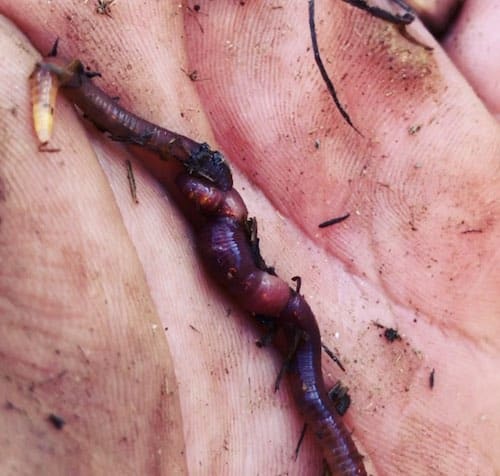The Incredible World of Red Wigglers: Increase Your Soil Fertility Today
The function of red wigglers, or Eisenia fetida, in improving dirt fertility is a subject of growing interest among gardeners and farming experts. These small yet effective organisms transform organic waste into valuable worm spreadings, significantly improving dirt health and promoting sustainable techniques. As we check out the benefits of vermicomposting and the sensible actions to develop an effective worm container, the possible influence of these worms on your gardening success ends up being progressively apparent. Comprehending the nuances of their treatment and application may just alter the method you approach dirt administration. What understandings can be acquired from integrating these remarkable animals into your horticulture routine?
Understanding Red Wigglers
Red wigglers, clinically referred to as Eisenia fetida, are a types of earthworm that play a crucial role in boosting dirt fertility. These worms thrive in organic-rich environments, such as compost piles and decaying plant material, where they take in natural waste and excrete nutrient-dense castings. Their special anatomy, including a fractional body and a clitellum, enables them to reproduce swiftly and successfully process big quantities of raw material.

The ecological importance of red wigglers extends past plain waste processing; they contribute to the soil food internet, cultivating a varied community of microorganisms that further boost soil health. Comprehending the biology and habits of red wigglers is vital for utilizing their complete potential in lasting farming and gardening practices.
Benefits of Vermicomposting
(Red Wiggler Express)Utilizing the power of red wigglers through vermicomposting offers many benefits that dramatically improve soil health and wellness and fertility. Among the main benefits is the production of nutrient-rich worm castings, which are an excellent natural fertilizer. Red Wiggler Express. These castings contain crucial nutrients like nitrogen, phosphorus, and potassium, promoting robust plant growth and improving plant returns
The existence of worm castings boosts dirt structure, permitting for much better water retention and drain. Red wigglers help damage down organic issue, increasing disintegration and reusing nutrients back into the dirt.
Vermicomposting additionally promotes microbial task, which is essential for a healthy and balanced dirt community. Beneficial microbes prosper in the existence of worm castings, assisting in the malfunction of natural materials and improving nutrition schedule to plants.
Lastly, vermicomposting offers as an effective waste administration solution, reducing garbage dump waste by recycling kitchen these details area scraps and other organic materials. This not just adds to ecological sustainability but likewise advertises a circular economic climate within gardening and agriculture.
Just How to Establish a Worm Container
Establishing a worm container is a simple procedure that can significantly improve your composting efforts. Begin by selecting an appropriate container, which can vary from a commercially available worm container to a simple plastic or wooden box (Red Wiggler Express). Make sure the container has appropriate air flow; tiny openings in the lid and sides will certainly assist in air flow
Following, develop a bed linens layer to supply a comfy atmosphere for the red wigglers. This can be made from shredded paper, cardboard, or coconut coir, dampened to a damp, sponge-like consistency. Fill the container to about one-third complete with this bed linen material.
Once the bed linen is prepared, it's time to present the worms. Red wigglers flourish in natural waste, so area them gently onto the bed linens. Cover the worms with a light layer of added bedding to assist them adapt.
Feeding Your Red Wigglers
Providing the best food for your red wigglers is vital for their wellness and the performance of your composting system. Red wigglers prosper on a varied diet, primarily being composed of organic materials such as fruit and vegetable scraps, coffee premises, and shredded paper. These products not only provide important nutrients yet additionally add to the microbial activity in the worm container, which is crucial for the worms' food digestion.
It is necessary to prevent certain foods, such as milk products, oils, and meats, as these can bring in pests and create unpleasant smells. Additionally, citrus peels and excessively spicy foods must be limited as a result of their possible to damage the worms. A well balanced method to feeding entails keeping an eye on the amount of food introduced to the bin, making sure that it is consumed within a practical timespan to stop excess waste buildup.
To promote optimal food digestion, it is beneficial to slice or shred larger food products before including them to the bin. This method raises the area for microbial action, facilitating quicker decay and boosting the total effectiveness of your composting system. Consistently observing the worms' feeding behaviors will certainly assist you change their diet plan as essential.
Utilizing Worm Spreadings in Your Garden

(Lake Hickory Bait)Integrating worm spreadings into your garden can be accomplished by mixing them right into the soil or utilizing them as a top dressing. The slow-release nature of these castings ensures that nutrients are offered to plants over a prolonged period, reducing the need for synthetic plant foods. In addition, worm castings include useful microbes that promote healthy soil ecosystems, boosting the overall resilience of your yard.
To make the most of the advantages, aim to apply about one part worm spreadings to three parts soil in your planting beds. Normal applications can bring about boosted crop returns and much healthier plants, making worm spreadings an indispensable resource for both novice and seasoned garden enthusiasts alike. By using this all-natural modification, you can grow a thriving yard while adding to lasting gardening techniques.
Final Thought
Finally, red wigglers exemplify the essential duty of vermicomposting in improving soil fertility. Their capacity to transform organic waste into nutrient-rich castings dramatically enriches soil structure and sustains microbial variety. Developing a vermicomposting system not just promotes sustainable gardening techniques but also adds to environmental wellness. By leveraging the advantages of these impressive microorganisms, garden enthusiasts can grow extra efficient and resilient environments, eventually promoting an extra lasting method to farming and gardening.